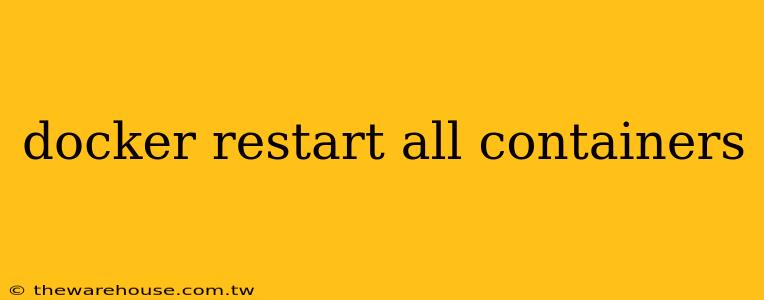Docker containers are a fantastic way to manage applications, but sometimes you need to restart them all at once. Whether it's for system maintenance, a post-update check, or troubleshooting a widespread issue, knowing how to efficiently restart all your containers is crucial. This guide will provide various methods, from simple commands to more sophisticated approaches, ensuring you can handle any scenario.
Why Restart All Docker Containers?
Several reasons might necessitate restarting all your Docker containers simultaneously:
- System Updates: After a kernel or system update, restarting containers ensures they're compatible with the new environment.
- Post-Deployment Checks: After deploying a new application or updating existing ones, a full restart confirms everything is functioning correctly.
- Troubleshooting: If a widespread issue affects multiple containers, a complete restart can resolve temporary glitches.
- Resource Management: A full restart can free up resources if containers have become unresponsive or are consuming excessive memory.
Methods for Restarting All Docker Containers
There are several ways to accomplish this, each with its own advantages and disadvantages. We'll cover the most common and effective methods.
Method 1: Using docker restart with docker ps (Simplest Approach)
This is the most straightforward method, ideal for smaller deployments:
-
List Running Containers: First, list all your running containers using the command:
docker ps -
Identify Container IDs: Note the
CONTAINER IDfor each running container. You'll need these for the next step. -
Restart Each Container Individually: Use the
docker restartcommand, specifying eachCONTAINER ID:docker restart <CONTAINER_ID_1> docker restart <CONTAINER_ID_2> docker restart <CONTAINER_ID_3> ...Replace
<CONTAINER_ID_1>,<CONTAINER_ID_2>, etc., with the actual container IDs.
Limitations: This method is cumbersome for environments with many containers.
Method 2: Using a Loop with docker ps and xargs (More Efficient for Multiple Containers)
This method automates the process using xargs, making it far more efficient for numerous containers:
docker ps -q | xargs -I {} docker restart {}
docker ps -q: This lists only the container IDs, making the output cleaner and easier forxargsto process.xargs -I {} docker restart {}: This takes the list of container IDs and executesdocker restartfor each one.-I {}specifies that{}will be replaced with each container ID.
Method 3: Restarting All Containers Including Stopped Ones (Advanced)
If you need to restart all containers, including those that are stopped, you'll need a slightly different approach. This uses docker container ls -a to list all containers, regardless of their state:
docker container ls -a -q | grep -v "^<none>{{content}}quot; | xargs -I {} docker restart {}
docker container ls -a -q: Lists all containers (running and stopped) and only shows their IDs.grep -v "^<none>{{content}}quot;: This filters out any lines that contain only<none>, which sometimes appears in the output.xargs -I {} docker restart {}: Similar to the previous method, this appliesdocker restartto each container ID.
Caution: This method will attempt to restart even containers that might be in an unrecoverable state. It's crucial to understand the potential consequences before using this command.
Method 4: Using Docker Compose (For Compose-managed Containers)
If your containers are managed by Docker Compose, restarting them is simpler:
docker-compose restart
This command will restart all containers defined in your docker-compose.yml file. This is the recommended approach if you use Docker Compose for your application deployment.
Best Practices and Considerations
- Backup and Recovery: Before undertaking a large-scale restart, ensure you have appropriate backups of your data.
- Monitoring: Monitor your containers after restarting to ensure they're all functioning correctly. Use tools like
docker statsto check resource usage. - Testing: Test your restart procedure in a non-production environment first to ensure it works as expected.
- Container Logs: Examine container logs (
docker logs <CONTAINER_ID>) to troubleshoot any issues after restarting.
By understanding these methods and employing best practices, you can efficiently and safely restart all your Docker containers, maintaining the health and stability of your applications. Remember to choose the method best suited to your specific needs and environment.
